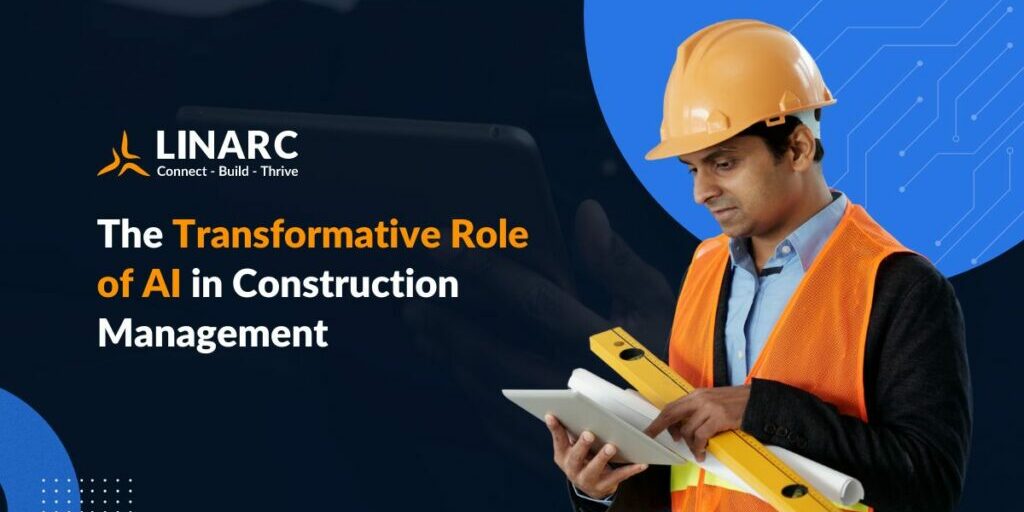The Transformative Role of AI in Construction Management

The construction industry, a cornerstone of global infrastructure development, faces a myriad of challenges in the 21st century. From meeting growing demands for sustainable and efficient structures to addressing labor shortages and safety concerns, the industry is at a crossroads.
Fortunately, the integration of Artificial Intelligence (AI) has emerged as a game-changer, revolutionizing traditional construction processes. In this blog post, we will delve into the transformative impact of AI on construction, exploring innovative ways it reshapes the industry and addressing key aspects such as AI-driven design and planning, robotics and automation, safety monitoring, augmented reality, Building Information Modeling (BIM), and sustainable construction.
Here’s what we cover:
How AI is Revolutionizing the Construction Management Landscape
1. AI-Driven Design and Planning
One of the most significant contributions of AI to the construction industry is in the realm of design and planning. Generative design, a paradigm enabled by AI algorithms, empowers architects and engineers to explore various design possibilities. This not only enhances aesthetics, but also optimizes structures for functionality, cost-effectiveness, and sustainability.
AI-powered planning tools leverage vast datasets to create meticulous project timelines, optimize construction project workflow, reduce delays, and manage construction costs, thus enhancing overall project efficiency.
2. Robotics and Automation
AI-driven robotics is revolutionizing construction by automating repetitive and labor-intensive tasks. From bricklaying to welding, AI-powered robots can execute these tasks with precision and efficiency, significantly increasing productivity and cost-effectiveness, and streamlining operations management in construction.
Companies like Fastbrick Robotics have developed robots capable of laying bricks at an unprecedented speed, showcasing the transformative potential of AI in automating traditionally manual processes and ushering in a new era of construction efficiency.
3. AI for Safety Monitoring
Safety is paramount in the construction industry, and AI is pivotal in enhancing safety measures. AI-based surveillance systems provide real-time monitoring of construction sites, identifying potential hazards and enabling swift response to prevent accidents. Fueled by AI algorithms, predictive analytics add another layer of safety by anticipating potential risks, thus creating a proactive approach to accident prevention. Integrating AI contributes significantly to fostering a safer working environment for construction professionals.
4. Augmented Reality (AR) in Construction
Augmented Reality is another frontier where AI is making significant strides in construction. AR applications facilitate the visualization of designs in real-world contexts, promoting collaboration and informed decision-making.
AI-enhanced AR takes this a step further by providing dynamic, real-time data overlays, facilitating on-site problem-solving, and streamlining communication. The increasing accessibility of AR glasses and devices heralds a future where construction professionals can harness AI-driven AR for unprecedented project visualization and collaboration.
5. AI and Building Information Modeling (BIM)
The synergy between AI and Building Information Modeling (BIM) is reshaping project management in construction. The integration of AI into Building Information Modeling (BIM) processes enhances project management by providing advanced data analytics capabilities. AI algorithms analyze vast datasets generated during construction projects, offering insights that can inform better decision-making. This integration streamlines communication and collaboration among project stakeholders, fostering a more efficient, transparent, and collaborative construction management process.
6. Sustainable Construction with AI
AI is proving to be a catalyst for sustainability innovation in the construction industry. From designing energy-efficient buildings to monitoring and optimizing resource usage and promoting environmentally conscious practices. AI algorithms can analyze environmental data, recommend sustainable materials, and optimize energy consumption, contributing to a more sustainable and eco-friendly construction industry.
Challenges and Future Prospects
While the transformative impact of AI on construction is undeniable, challenges persist in its widespread adoption. Issues such as initial investment costs, resistance to change, and the need for specialized expertise pose hurdles for some companies. However, as technology advances, these challenges will likely diminish. Emerging trends such as using AI in 3D printing for construction and developing AI-powered drones offer glimpses into exciting possibilities.
As AI continues to evolve, its potential impact on the construction industry is vast. The integration of AI technologies promises improved efficiency and safety and a fundamental shift in how construction projects are conceived, planned, and executed. The industry stands on the brink of a new era, where AI is a driving force for innovation, sustainability, and growth.
Conclusion
AI is not merely a technological addendum to the construction industry but a transformative force, revolutionizing everything from design to execution. From enhancing safety measures to fostering sustainability and improving overall efficiency, AI is reshaping the construction landscape. Successful global projects stand as testaments to the transformative potential of these technologies.
As we navigate the challenges and embrace the future, the construction industry has a unique opportunity to leverage AI for continued growth and development. By embracing these innovations, stakeholders can build a tomorrow where construction is efficient, safe, sustainable, and technologically advanced. The time to embrace the transformative potential of AI in construction is now, paving the way for a future where the industry stands as a beacon of innovation and progress.




